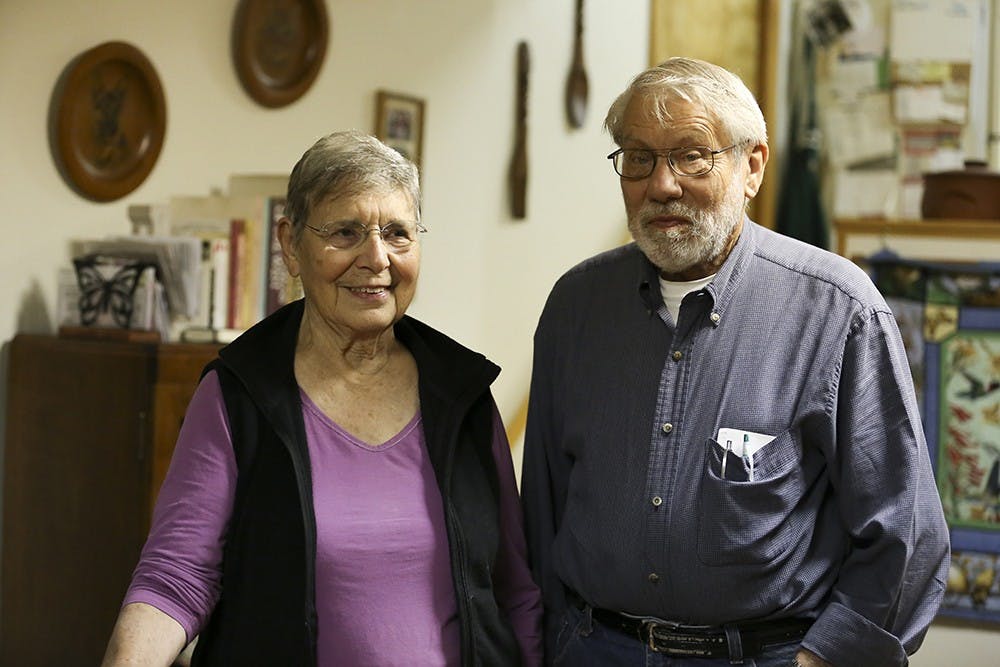So, in the late 1990s , once Marge had retired from her job as a school social worker , both she and her husband Jim, 83, decided to do their part in the voting process and help out where help was needed.
Some elections, like the last two presidential elections, were a “horrendous” amount of work, Marge said.
“The (midterm) ones — you can spend all day and get maybe 25 people,” Marge said. “Some of the precincts got none.”
An overwhelming majority of people — more than 90 percent of the estimated 245 total ?workers — working elections polls in Monroe County are older than 55 years old, County Clerk Linda Robbins said. This includes the Fabers.
Robbins said the clerk’s office is working to recruit more young people to work at the polls.
Kate Cruikshank is a member of the League of Women Voters of Bloomington and Monroe County and is its Voter Service chairperson.
In 2007, someone came to the League talking about problems with recruiting and training the people necessary to work the Election Day polls.
Cruikshank took it upon herself to do some investigating.
“I went through training, and training consisted of almost nothing,” Cruikshank said.
After eight hours of training sessions, she was directed to a tutorial video online. She watched it five times before she was ready to work the machines.
“I thought, ‘Well, I was a complete idiot when I went into this, so I’m going to write instructions for the complete idiot,’” she said. “So I did.”
The voting process, though, has changed substantially since Cruikshank decided to write her manual.
In 2011, Monroe County became the first county in Indiana to start utilizing a new paper ballot, the optical scanning system, Robbins said. In this system, voters fill out a paper ballot and then enter it into a machine that reads it. This way, paper backups are always still available.
Prior to this new system, the machines used paper ballots that were rotated with a crank, with the user pulling down levers to indicate voting choices. After that, touch-screen ?machines were used. It was after these touch screens that the optical scanning system was put in place, making for a more verifiable method.
These machines are overseen at the polls by workers known as judges. The judges also explained the machines to voters.
Judges work alongside clerks and inspectors at polling stations.
Clerks check to see if people are registered and check their voter ID. Inspectors are in charge of the whole operation.
For bigger and busier elections, like presidential general elections, assistant clerks and “sheriffs,” people who keep order at the polling location, may be brought in.
At each polling location, there are clerks and judges from both the Democratic and Republican parties, and the inspector is of whichever party received the highest number of votes for Indiana Secretary of State in the previous election.
Teamwork is achieved despite the party separations, though.
“When we got together, we were a team, and in the end, I couldn’t remember who was a Democrat and who was a Republican,” Cruikshank said.
That teamwork kicks in at the end of the night, she said, when the poll workers need to complete all of the necessary paperwork, competing with other precincts to see who can get it done first.
Bill Milroy, 72, also volunteers at the polls and will be there this November for the general elections in Monroe County.
He was born Dec. 7, 1941 — the day the Japanese attacked Pearl Harbor . History is in his blood.
”I’ve always been interested in politics and history, so (working the polls) gives me an opportunity to participate in them a little bit,” said Milroy, who is also treasurer for the Monroe County Libertarian Party and a member of the Bloomington League of Women Voters.
Milroy remembers his time working at the Unitarian Universalist Church, a precinct near campus and a popular voting spot for ?students.
He said it was “impressive” that students were willing to wait in line to vote.
The motivation behind working the polls varies from person to person — there are both social and financial aspects to the job.
Even so, Cruikshank says there’s a bigger cause.
“If you believe in democracy and you believe in elections and you believe in voting, then this is what you do as a citizen,” she said. “Because it’s not somebody else’s job — it’s our job.“





